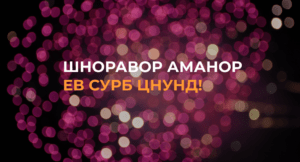In the capital of Armenia, no one will be bored. Literally every week there are musical concerts, meeting evenings, lectures, stand-ups, performances... Bringing these events to life is the work of the organizers, which is very difficult and differs from country to country.
We learned from Christina Babayan what the features of the Armenian concert industry are in comparison with the Russian one. In Moscow, Kristina organized events, owned a venue for 3,000 people, and was the director of a popular Russian group. Three years ago she came to Yerevan, fell in love with this city and did not want to leave. Now Kristina brings Russian artists and helps her colleagues with this.
Christina, do you remember your first Yerevan concert?
Yes, sure. It was Anna Yegoyan’s concert at the Sundukyan Theater - my coolest memories. I love Anna very much, she is a good person, a professional, it’s a pleasure to work with her, and she has wonderful poetry. I was calm at that concert. It is always more comfortable to work in the theater; they have had their own technicians working there for 300 years, who know how to set the lights correctly and adjust the sound. The prices there are always fair, it’s very cultured, the spectators are seated, so there’s no need for additional security, and there won’t be any incidents with the bar.

Photo: Facebook tomsarkgh.am
What do you like about working in Yerevan, how does it differ from Moscow?
You can agree on everything in five minutes with one call to the owner. It’s not seven handshakes that work here, but one and a half (that’s why it’s easy to enter the market). In Russia, to find an alcohol sponsor, you talk to a sales manager, marketing director, etc. They do monitoring, look at the relevance of your audience, whether they have a budget, and it was planned a year ago. In Armenia, a month before the event, you can find a sponsor who will simply ask how much money you need. And the owners of the sites rent them out without advance payment, but, accordingly, without a contract.
There is also a downside to this: everyone works through the “call a friend” service, otherwise they will rip money off you and won’t try. It may be easy to reach an agreement, but in fact no one guarantees you anything.
To some extent, the relaxation of local colleagues is a plus, because if you mess up, no one will tell you anything. But, of course, it is wrong to turn a blind eye to mistakes.
What are the difficulties of working in Armenia?
The attitude towards women is a separate case. You can’t come to meetings without a man, otherwise you won’t be accepted at all. In order for people to hear you, listen to you and follow your instructions, you need to include maximum rigor and clarity without the so-called feminine approach. And after a while they work with you as equals.
An unclear tax system, a bunch of abbreviations in addition to individual entrepreneurs and LLCs. At the same time, accountants themselves do not suggest optimizing expenses.
Only in recent years have places begun to open where they have good technical equipment and monitor fire safety: there is the required number of exits, fire-resistant materials, alarms, etc. I spent nine months rebuilding a club in Moscow, so I learned all the requirements by heart and immediately see the shortcomings.
There is no practice here that technicians stand behind the stage at a concert - they are only in the hall. But if something happens, you have to run through the crowd to the stage.
Many organizers have appeared, their concerts can even take place on the same day. The audience has a dilemma - who to go to see, and as a result, the halls are not filled. We need to agree within the market and not interfere with each other.
What was the most difficult concert to organize?
Xcho concert in Amalir on August 12, 2023. We had to solve the artist’s problem - to give his first big solo concert, and the choice fell on SKK. This is the only closed site in Armenia with a one-time presence of up to 10,000 people. This is the level after which an artist increases his status.
But the big problem was the lack of air conditioning in this huge room. Yerevan is a city of summer heat from 45 ℃, the cooling system in closed areas must be unconditional! The state-owned building is apparently awaiting subsidies. I am sure that with an air conditioning system, the site could be monetized much more and recoup subsidies within a year.
Premises of this scale are very complex in logistics and security, and there were problems with this too. An important task when holding concerts of this scale, especially in our turbulent times, is to ensure maximum safety. And I would really like my colleagues, when planning any events, not to spare the budget for safety, and that the venues provide it.

Photo: Tomsarkgh.am
Tell us about the features of organizing events when there is tension in society around war.
Artists can be attacked for their performances, but I don’t understand this. You can’t be stuck in grief forever; people need to get distracted for an hour and a half, breathe out, and throw out energy. When the meaning of life is lost, such bright moments provide an incentive to live.
It has never been customary in Armenia to buy tickets in advance, and even more so now. My peak sales are two days in advance. For the organizer, this is an eternal state of jitters. Plus you need to have plans B and C in the current unpredictable conditions.
You need to find out the artist’s political position - how much it coincides with the views of the audience; check background, watch interviews. There are those who don’t say anything bad, but simply treat the country with disdain, and the viewer feels it. And recently there was a situation with the rapper Andro: they found out that he was signed to a label owned by an Azerbaijani and raised the Azerbaijani flag. The concert was canceled, otherwise activists promised to block the road to the site.
What else is important in choosing an artist and, most importantly, running an advertising campaign?
You need to choose an artist not only based on the interests of Russians - they have enough problems of their own, not everyone can find the time and money for concerts. Locals are important. At the same time, Armenians may not know the artist’s name, but remember his face; don't remember the face, but know the songs. An advertising campaign is built with this in mind.
There is no target here as such, because the country is small, and they make a big banner - whoever it hits. Posters around the city are practically the only (together with SMM) way of advertising. In Yerevan, light-colored posters and the artist’s face work, since not everything is illuminated and gets dark early. The location depends on the target audience, as, by the way, does the choice of payment system. For example, young people use iDram more, while adults use Tomsarkgh and TelCell.
Photo from the personal archive of Christina Babayan and Instagram Respect Project
What, in addition to the above, should Russian organizers prepare for?
The first thing that all visiting organizers face is the “don’t worry, everything will be okay” mentality or translation difficulties. In Moscow you say: “I want it to be like this,” and you discuss what is there and what you will replace. Here they tell you: everything is there, and they do what they think is right. For example, a household rider lists Evian water, and five minutes before the event you see “Aparan” in the dressing room and hear: “We have the most delicious water.” The same goes for the technical rider.
Understanding of standards differs. Moscow “above average” is a high level in Yerevan. When Russians come and try to tell you how it should be done, the locals are more likely to refuse, because they are used to working in their own way. As a result, the organizers have to agree, as long as the booked event takes place.
There is a concept “in Armenian” - it’s almost like “Russian roulette”, you never know at what moment the power will be turned off in the area and where the equipment may jam. It is impossible to provide for a fakap, even with enormous experience, in Armenia; it is always a quest that only adds knowledge for the future.
In Armenia they do not like documentation; a “conceptual” agreement has more weight. In Moscow, we are used to signing an agreement with the artist, with the venue, with the box office, with the City Hall about advertising, and this is a must-have that will help resolve disagreements and oblige both parties to clearly carry out tasks. Here, many were offended and perplexed when I asked for the “fish” of the contract to be reviewed by lawyers.
The last thing is the platforms. According to all the laws of the genre, the rented site must be prepared for delivery: clean, staffed and equipped according to the minimum points in the signed contract. In fact, you most often finish the site yourself, and this leads to additional costs of both time and budget. In Armenia, you have to be prepared to be given four walls with a roof or an open-air lawn, which will include, as a bonus, the wind from the mountains and the smell of herbs.
There are plenty of difficulties. What do you see as a way out of this?
I want to bring together organizers and site owners to make friends, share experiences and set a framework that is convenient for everyone. Together we will establish business ethics and rise to the world level. We could gather foreign organizers and tell them what they will face. This way they will make fewer mistakes and at the same time will not interfere with the locals’ work.

Photo from the personal archive of Christina Babayan
You talk so passionately about your work. Why do you love her?
I feel a thrill when I come to the hall five minutes before the concert, exhausted, with a bun on my head and in a sweatshirt, I look through everything, exhale a little and understand that I did all this, and people came to enjoy it. And the second moment is when the concert ends, everyone happy starts clapping. This feeling is incomparable to anything.
And a couple of final questions. Respect Project has already brought Olga Buzova, Guf's concert will take place on April 6. Which Russian artist do you dream of bringing to Yerevan?
You can’t bring an artist based on what you like - you need to know the domestic market. But if I dream, I really want to see MiyaGi in Yerevan. He hasn't given concerts for a long time, but I hope one day he will return to the stage.
Give us a hint, who should we expect next in Yerevan?
I can’t say openly, because he is a very large-scale artist who is highly desired for his arrival. He has never been here, and there will definitely be difficult organizational work, but I love quests.
Intrigued. We wish you success, continue to delight us with bright events, and let them reach a new level.






















Add a comment